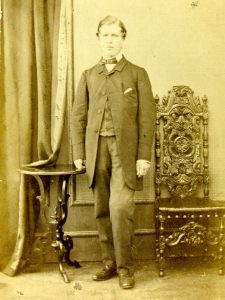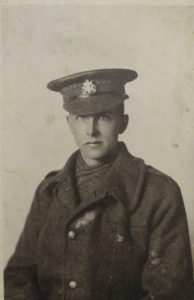In January I did a talk as part of the Thursday lunchtime recital room series. It was entitled ‘Memories from the Archives’ and I talked about a number of memories from Old Scholars. I’ll share the photographs and text from the talk in several parts on the blog. Read Part 1 here, Part 2 here and Part 3 here.

Joshua Rowntree also attended Bootham at around the same time as Edward R. Allen (see Part 3). His entry in the 1914 Register includes some memories. “I started life at Bootham as a ‘brat’, subject, with eleven others, to a weekly foot washing by “Pea on a Broomstick”, as a tall housemaid with a small head was known amongst us.” We know very little about the non-teaching staff at the school from earlier years – often the only clues you have are brief mentions such as this.
Joshua goes on to talk about what he learned at school: “One thing I learned fairly well – to make fires. We might volunteer for stoking, receiving, I think, 6d. a week in recompense. It was a longish way from No. 2 bedroom to the schoolroom grates on cold, dark mornings, but a boy ought to know how to build up a fire quickly, and I never regretted the work.”
He also mentions games: “It was the pre-scientific period for games. Cricket was rather haphazard, and the junior club often resolved itself into discussions in the high key. Football had not come. Stag a rag was one of the best playground games with the rare exceptions of a big slide in time of frost, and Run-across was naturally enjoyable to a fair sized fellow. Boys who had sisters at the Girls’ school got a good run each week to accomplish their ‘visit’ in the half-hour after breakfast at Castlegate; and in after years in the hour before dinner at the Mount. The latter time was seriously curtailed when Mr. Hill and the old ferryman happened to be at the wrong side of the river with both boats together.”
It wasn’t until 1862 that the first football match was played, and Lendal Bridge wouldn’t open until 1863. As far as I can find out, Stag a rag appears to have been a version of tag.

